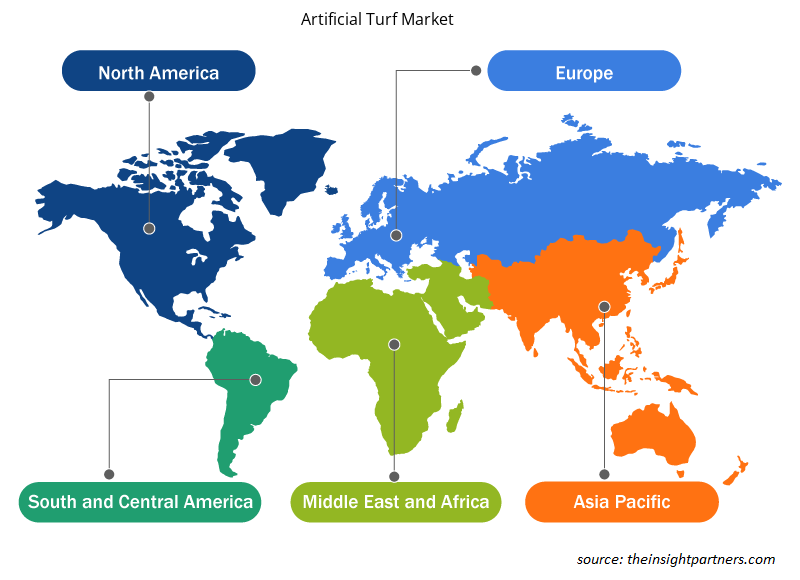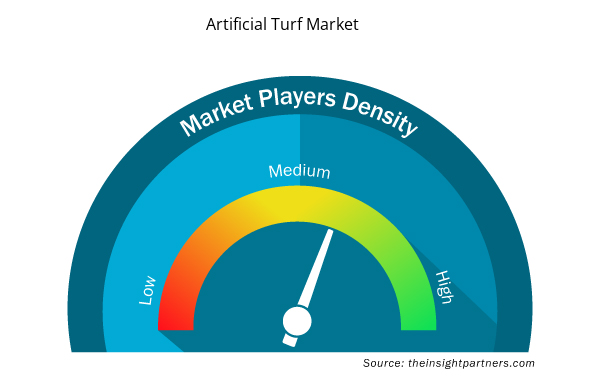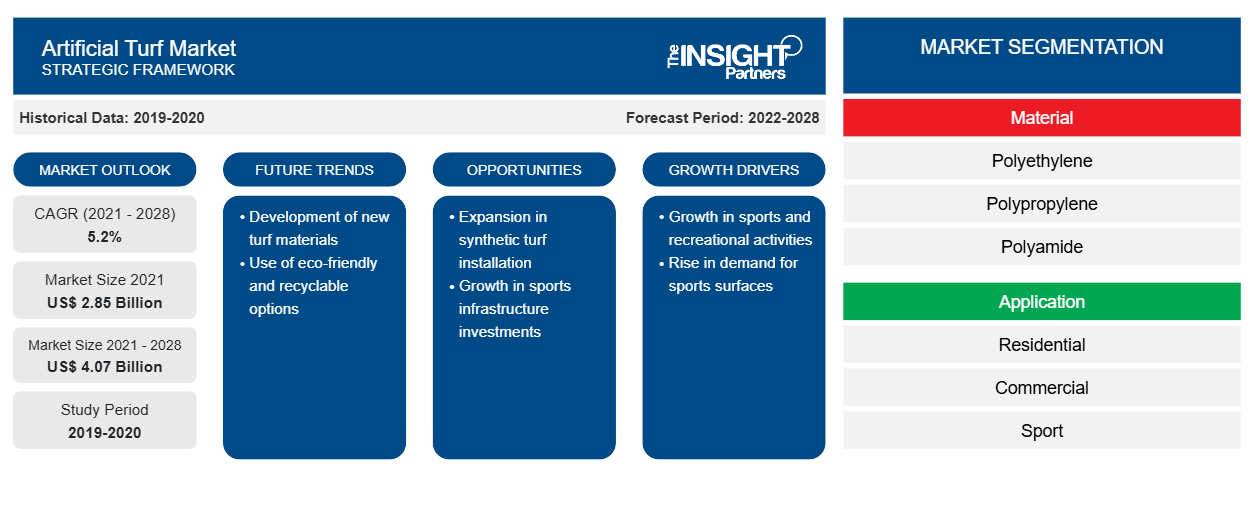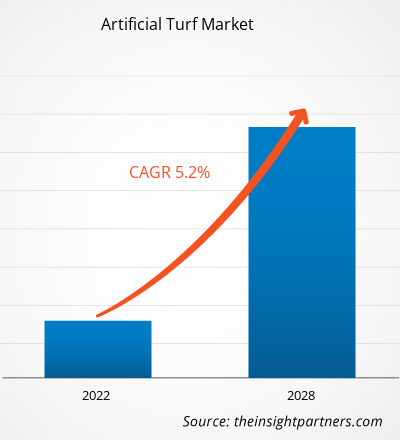Der Markt für Kunstrasen wurde im Jahr 2021 auf 2.847,28 Millionen US-Dollar geschätzt und soll bis 2028 4.067,36 Millionen US-Dollar erreichen. Von 2021 bis 2028 wird ein durchschnittliches jährliches Wachstum von 5,2 % erwartet.
Kunstrasen wird aus synthetischen Fasern hergestellt und imitiert Naturrasen. Zu den Rohstoffen für die Herstellung von Kunstrasen gehören Polyethylen (PE), Polypropylen (PP), Polyamid (Nylon), Gummimischungen, Polyesterschaum, verschiedene Farben und andere Zusatzstoffe. Die Qualität der Rohstoffe ist für die Leistung des Rasens von entscheidender Bedeutung.
Der globale Kunstrasenmarkt wird anhand von Material, Anwendung und Geografie analysiert. Im Jahr 2020 hatte der asiatisch-pazifische Raum den größten Umsatzanteil am globalen Kunstrasenmarkt. Der Hauptfaktor für das Wachstum des Kunstrasenmarktes im asiatisch-pazifischen Raum ist die zunehmende Verwendung von Kunstrasen im Haushaltsbereich. Die verschiedenen Vorteile von Kunstrasen wie geringerer Wasser- und Chemikalienverbrauch, geringer Wartungsaufwand, keine Bewässerung und Wetterbeständigkeit tragen zu einer hohen Nachfrage nach Kunstrasen von Sportanlagen bei. Darüber hinaus begünstigen auch die zunehmende Globalisierung und das Wachstum der Bauindustrie das Wachstum des Kunstrasenmarktes. Darüber hinaus haben die Marktteilnehmer in dieser Region massiv in F&E-Initiativen investiert und so zur Entwicklung mehrerer innovativer Produkte beigetragen, was diesem regionalen Markt zugutekommt.
Passen Sie diesen Bericht Ihren Anforderungen an
Sie erhalten kostenlos individuelle Anpassungen an jedem Bericht, einschließlich Teilen dieses Berichts oder einer Analyse auf Länderebene, eines Excel-Datenpakets sowie tolle Angebote und Rabatte für Start-ups und Universitäten.
- Holen Sie sich die wichtigsten Markttrends aus diesem Bericht.Dieses KOSTENLOSE Beispiel umfasst eine Datenanalyse von Markttrends bis hin zu Schätzungen und Prognosen.
Auswirkungen der COVID-19-Pandemie auf den Kunstrasenmarkt
Die COVID-19-Pandemie brachte für viele Branchen beispiellose Herausforderungen mit sich, darunter auch für die Chemie- und Materialindustrie. Aufgrund landesweiter Ausgangssperren und Grenzbeschränkungen wurden die Lieferketten vollständig unterbrochen. Dies hat sich auf die Produktion und den Vertrieb verschiedener Produkte ausgewirkt. Viele Erholungsgebiete und Spielplätze wurden aufgrund des Virus geschlossen, was zu einem Anstieg der Heimwerkerarbeiten auf der ganzen Welt geführt hat. Laut Synthetic Grass Warehouse verzeichnen Kunstrasen-Auftragnehmer Umsatzzuwächse von bis zu 30 % gegenüber 2020. Sportplatzanwendungen machten 63 % des im Jahr 2020 installierten Rasens aus und werden voraussichtlich im Prognosezeitraum der größte Anwendungsbereich bleiben. Rasen in Landschaftsanwendungen wächst jedoch rasant. In naher Zukunft werden E-Commerce- Plattformen beim Verkauf verschiedener wichtiger und nicht lebensnotwendiger Güter, insbesondere Kunstrasen, voraussichtlich deutlich an Dynamik gewinnen.
Markteinblicke
Wachsende Nachfrage nach Kunstrasen seitens der Sportindustrie und zunehmende Anzahl von Stadien
Kunstrasen eignet sich für verschiedene Sportarten, wird aber häufig für Baseball, Football, Lacrosse, Rugby und Fußball verwendet. Im Jahr 2021 entschied sich das Bank of America Stadium, von Naturrasen auf Kunstrasen umzusteigen. Tepper Sports & Entertainment kündigte an, vor der Saison 2021 der Carolina Panthers von Gras auf FieldTurf umzusteigen. Das BC Place Stadium wird bis Ende Januar 2022 auch in Kanada einen neuen Kunstrasenplatz haben. Darüber hinaus sind in Städten und Dörfern in Ländern wie Indien Kunstrasenplätze entstanden. Daher treiben die wachsende Nachfrage nach Kunstrasen in der Sportbranche und eine zunehmende Anzahl von Stadien mit Kunstrasen den globalen Kunstrasenmarkt erheblich an.
Anwendungseinblicke
Basierend auf der Anwendung wurde der globale Kunstrasenmarkt in Wohn-, Gewerbe- und Sportbereiche segmentiert. Das Sportsegment hatte im Jahr 2020 den größten Anteil am globalen Kunstrasenmarkt. Kunstrasen wird häufig auf Sportplätzen verwendet. Er wird hauptsächlich verwendet, um eine geeignete Oberfläche für Sportarten bereitzustellen, die auf Gras in Gebieten gespielt werden, in denen die Pflege von Naturrasen schwierig ist oder dieser nicht wachsen kann. Eine hohe Nachfrage nach Kunstrasen aus der Sportbranche ist hauptsächlich auf verschiedene Faktoren wie einfache Pflege, längere Spielzeit usw. zurückzuführen.
Zu den Hauptakteuren auf dem globalen Kunstrasenmarkt zählen The Dow Chemical Company, Tarkett, Act Global, CCGrass, TenCate Grass, SIS Pitches, Victoria PLC, GreenFields BV, HATKO und Hellas Construction, Inc. Diese Akteure konzentrieren sich bei ihrer Expansion hauptsächlich auf verschiedene Strategien, wie die Einführung neuer Produkte, Expansion sowie Fusionen und Übernahmen.
Regionale Einblicke in den Kunstrasenmarkt
Die regionalen Trends und Faktoren, die den Kunstrasenmarkt im Prognosezeitraum beeinflussen, wurden von den Analysten von Insight Partners ausführlich erläutert. In diesem Abschnitt werden auch die Marktsegmente und die Geografie des Kunstrasenmarkts in Nordamerika, Europa, im asiatisch-pazifischen Raum, im Nahen Osten und Afrika sowie in Süd- und Mittelamerika erörtert.

- Holen Sie sich die regionalspezifischen Daten für den Kunstrasenmarkt
Umfang des Marktberichts für Kunstrasen
| Berichtsattribut | Details |
|---|---|
| Marktgröße im Jahr 2021 | 2,85 Milliarden US-Dollar |
| Marktgröße bis 2028 | 4,07 Milliarden US-Dollar |
| Globale CAGR (2021 - 2028) | 5,2 % |
| Historische Daten | 2019-2020 |
| Prognosezeitraum | 2022–2028 |
| Abgedeckte Segmente | Nach Material
|
| Abgedeckte Regionen und Länder | Nordamerika
|
| Marktführer und wichtige Unternehmensprofile |
|
Marktteilnehmerdichte: Der Einfluss auf die Geschäftsdynamik
Der Markt für Kunstrasen wächst rasant, angetrieben durch die steigende Nachfrage der Endnutzer aufgrund von Faktoren wie sich entwickelnden Verbraucherpräferenzen, technologischen Fortschritten und einem größeren Bewusstsein für die Vorteile des Produkts. Mit steigender Nachfrage erweitern Unternehmen ihr Angebot, entwickeln Innovationen, um die Bedürfnisse der Verbraucher zu erfüllen, und nutzen neue Trends, was das Marktwachstum weiter ankurbelt.
Die Marktteilnehmerdichte bezieht sich auf die Verteilung von Firmen oder Unternehmen, die in einem bestimmten Markt oder einer bestimmten Branche tätig sind. Sie gibt an, wie viele Wettbewerber (Marktteilnehmer) in einem bestimmten Marktraum im Verhältnis zu seiner Größe oder seinem gesamten Marktwert präsent sind.
Die wichtigsten auf dem Kunstrasenmarkt tätigen Unternehmen sind:
- Die Dow Chemical Company
- Tarkett
- Global handeln
- CCGras
- TenCate Gras
Haftungsausschluss : Die oben aufgeführten Unternehmen sind nicht in einer bestimmten Reihenfolge aufgeführt.

- Überblick über die wichtigsten Akteure auf dem Kunstrasenmarkt
Bericht-Spotlights
- Fortschrittliche Branchentrends im Kunstrasenmarkt helfen den Akteuren bei der Entwicklung wirksamer langfristiger Strategien
- In Industrie- und Entwicklungsländern angewandte Strategien für Unternehmenswachstum
- Quantitative Analyse des Kunstrasenmarktes von 2019 bis 2028
- Schätzung der weltweiten Nachfrage nach Kunstrasen
- Porters Fünf-Kräfte-Analyse zur Veranschaulichung der Wirksamkeit der in der Branche tätigen Käufer und Lieferanten
- Aktuelle Entwicklungen zum Verständnis des Wettbewerbsmarktszenarios
- Markttrends und -aussichten sowie Faktoren, die das Wachstum des Kunstrasenmarktes vorantreiben und bremsen
- Unterstützung im Entscheidungsprozess durch Aufzeigen von Marktstrategien, die das kommerzielle Interesse untermauern und zum Marktwachstum führen
- Die Größe des Kunstrasenmarktes an verschiedenen Knotenpunkten
- Detaillierte Übersicht und Segmentierung des Marktes sowie der Dynamik der Kunstrasenindustrie
- Größe des Kunstrasenmarktes in verschiedenen Regionen mit vielversprechenden Wachstumschancen
Globaler Markt für Kunstrasen
Material
- Polyethylen
- Polypropylen
- Polyamid
- Sonstiges
Anwendung
- Wohnen
- Kommerziell
- Sport
Firmenprofile
- Die Dow Chemical Company
- Tarkett
- Global handeln
- CCGras
- TenCate Gras
- SIS Stellplätze
- Victoria PLC
- GreenFields BV
- HATKO
- Hellas Construction, Inc.
- Historische Analyse (2 Jahre), Basisjahr, Prognose (7 Jahre) mit CAGR
- PEST- und SWOT-Analyse
- Marktgröße Wert/Volumen – Global, Regional, Land
- Branche und Wettbewerbsumfeld
- Excel-Datensatz


- Bioremediation Technology and Services Market
- Water Pipeline Leak Detection System Market
- Machine Condition Monitoring Market
- Webbing Market
- Nuclear Waste Management System Market
- USB Device Market
- Environmental Consulting Service Market
- Molecular Diagnostics Market
- Queue Management System Market
- Extracellular Matrix Market

Report Coverage
Revenue forecast, Company Analysis, Industry landscape, Growth factors, and Trends

Segment Covered
This text is related
to segments covered.

Regional Scope
North America, Europe, Asia Pacific, Middle East & Africa, South & Central America

Country Scope
This text is related
to country scope.
Häufig gestellte Fragen
Europe is estimated to register the fastest CAGR in the global artificial turf market over the forecast period. With the presence of various artificial turf brands, Europe has been one of the key regions for the global artificial turf market. Europe is anticipated to witness a growing demand for artificial turf during the forecast period, owing to the increasing number of stadiums in the region.
The sports segment held the largest share of the artificial turf market in 2021. It is one of the most crucial application segments of artificial turf and is most often used for baseball, football, rugby, soccer, lacrosse, and others.
The sports segment is the fastest-growing segment in the global artificial turf market during the forecasted period. Artificial turf is also commonly used in sports stadiums and arenas. There is a high demand for artificial turf from the sports industry due to easy maintenance and more playing time.
The polyethylene segment held the largest share of the global artificial turf market in 2021. Polyethylene is one of the most commonly used materials in the artificial turf industry. Polyethylene grass is ideal for front and backyard applications, sports, and pets due to a combination of softness, realism, and the lack of moisture absorption.
The major players operating in the global artificial turf market are The Dow Chemical Company; Tarkett; Act Global; CCGrass; TenCate Grass; SIS Pitches; Victoria PLC; GreenFields BV; HATKO; Hellas Construction, Inc.; among others.
In 2021, Asia Pacific held the largest share of the global artificial turf market. In Asia-Pacific, the demand for artificial turf is increasing, mainly due to the rising use of artificial turf in the residential sector. Moreover, the rise in residential and commercial infrastructural facilities across the region is driving market growth.
Trends and growth analysis reports related to Chemicals and Materials : READ MORE..
The List of Companies - Artificial Turf Market
- The Dow Chemical Company
- Tarkett
- Act Global
- CCGrass
- TenCate Grass
- SIS Pitches
- Victoria PLC
- GreenFields BV
- HATKO
- Hellas Construction, Inc.
The Insight Partners performs research in 4 major stages: Data Collection & Secondary Research, Primary Research, Data Analysis and Data Triangulation & Final Review.
- Data Collection and Secondary Research:
As a market research and consulting firm operating from a decade, we have published and advised several client across the globe. First step for any study will start with an assessment of currently available data and insights from existing reports. Further, historical and current market information is collected from Investor Presentations, Annual Reports, SEC Filings, etc., and other information related to company’s performance and market positioning are gathered from Paid Databases (Factiva, Hoovers, and Reuters) and various other publications available in public domain.
Several associations trade associates, technical forums, institutes, societies and organization are accessed to gain technical as well as market related insights through their publications such as research papers, blogs and press releases related to the studies are referred to get cues about the market. Further, white papers, journals, magazines, and other news articles published in last 3 years are scrutinized and analyzed to understand the current market trends.
- Primary Research:
The primarily interview analysis comprise of data obtained from industry participants interview and answers to survey questions gathered by in-house primary team.
For primary research, interviews are conducted with industry experts/CEOs/Marketing Managers/VPs/Subject Matter Experts from both demand and supply side to get a 360-degree view of the market. The primary team conducts several interviews based on the complexity of the markets to understand the various market trends and dynamics which makes research more credible and precise.
A typical research interview fulfils the following functions:
- Provides first-hand information on the market size, market trends, growth trends, competitive landscape, and outlook
- Validates and strengthens in-house secondary research findings
- Develops the analysis team’s expertise and market understanding
Primary research involves email interactions and telephone interviews for each market, category, segment, and sub-segment across geographies. The participants who typically take part in such a process include, but are not limited to:
- Industry participants: VPs, business development managers, market intelligence managers and national sales managers
- Outside experts: Valuation experts, research analysts and key opinion leaders specializing in the electronics and semiconductor industry.
Below is the breakup of our primary respondents by company, designation, and region:

Once we receive the confirmation from primary research sources or primary respondents, we finalize the base year market estimation and forecast the data as per the macroeconomic and microeconomic factors assessed during data collection.
- Data Analysis:
Once data is validated through both secondary as well as primary respondents, we finalize the market estimations by hypothesis formulation and factor analysis at regional and country level.
- Macro-Economic Factor Analysis:
We analyse macroeconomic indicators such the gross domestic product (GDP), increase in the demand for goods and services across industries, technological advancement, regional economic growth, governmental policies, the influence of COVID-19, PEST analysis, and other aspects. This analysis aids in setting benchmarks for various nations/regions and approximating market splits. Additionally, the general trend of the aforementioned components aid in determining the market's development possibilities.
- Country Level Data:
Various factors that are especially aligned to the country are taken into account to determine the market size for a certain area and country, including the presence of vendors, such as headquarters and offices, the country's GDP, demand patterns, and industry growth. To comprehend the market dynamics for the nation, a number of growth variables, inhibitors, application areas, and current market trends are researched. The aforementioned elements aid in determining the country's overall market's growth potential.
- Company Profile:
The “Table of Contents” is formulated by listing and analyzing more than 25 - 30 companies operating in the market ecosystem across geographies. However, we profile only 10 companies as a standard practice in our syndicate reports. These 10 companies comprise leading, emerging, and regional players. Nonetheless, our analysis is not restricted to the 10 listed companies, we also analyze other companies present in the market to develop a holistic view and understand the prevailing trends. The “Company Profiles” section in the report covers key facts, business description, products & services, financial information, SWOT analysis, and key developments. The financial information presented is extracted from the annual reports and official documents of the publicly listed companies. Upon collecting the information for the sections of respective companies, we verify them via various primary sources and then compile the data in respective company profiles. The company level information helps us in deriving the base number as well as in forecasting the market size.
- Developing Base Number:
Aggregation of sales statistics (2020-2022) and macro-economic factor, and other secondary and primary research insights are utilized to arrive at base number and related market shares for 2022. The data gaps are identified in this step and relevant market data is analyzed, collected from paid primary interviews or databases. On finalizing the base year market size, forecasts are developed on the basis of macro-economic, industry and market growth factors and company level analysis.
- Data Triangulation and Final Review:
The market findings and base year market size calculations are validated from supply as well as demand side. Demand side validations are based on macro-economic factor analysis and benchmarks for respective regions and countries. In case of supply side validations, revenues of major companies are estimated (in case not available) based on industry benchmark, approximate number of employees, product portfolio, and primary interviews revenues are gathered. Further revenue from target product/service segment is assessed to avoid overshooting of market statistics. In case of heavy deviations between supply and demand side values, all thes steps are repeated to achieve synchronization.
We follow an iterative model, wherein we share our research findings with Subject Matter Experts (SME’s) and Key Opinion Leaders (KOLs) until consensus view of the market is not formulated – this model negates any drastic deviation in the opinions of experts. Only validated and universally acceptable research findings are quoted in our reports.
We have important check points that we use to validate our research findings – which we call – data triangulation, where we validate the information, we generate from secondary sources with primary interviews and then we re-validate with our internal data bases and Subject matter experts. This comprehensive model enables us to deliver high quality, reliable data in shortest possible time.


 Holen Sie sich ein kostenloses Muster für diesen Bericht
Holen Sie sich ein kostenloses Muster für diesen Bericht